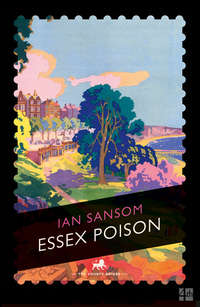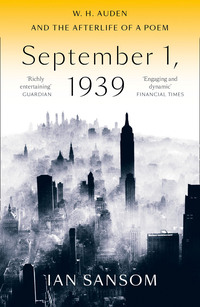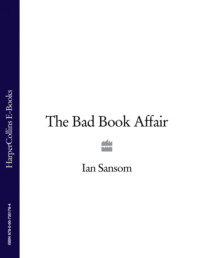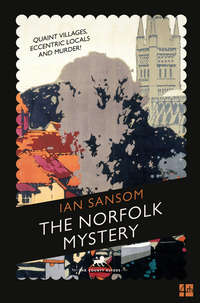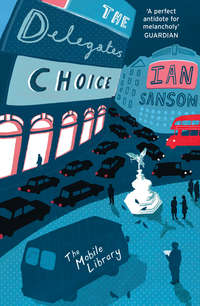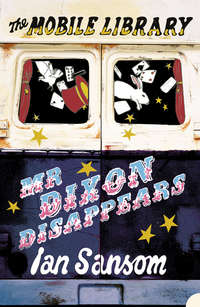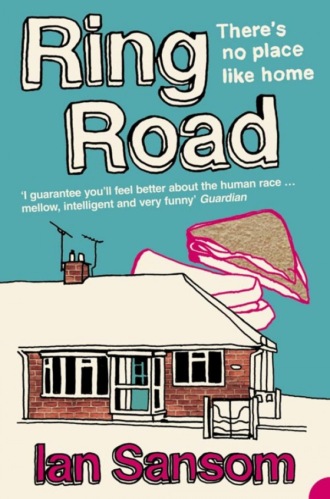
Полная версия
Ring Road: There’s no place like home
‘Jesus!’ screamed the driver, having lost all vision through the windscreen in what seemed to be a massive and magic stream of liquid pouring down from the heavens, as if God, or Jesus, were now pissing directly on to the car, as if He were getting ready for an evening out, and they swerved across three lanes and pulled over on to the hard shoulder.
‘Did you see that?’
‘I did,’ said Davey.
‘Jesus Christ. Blinded me.’
‘You OK?’
‘Yeah, thanks. Yeah. I’m fine.’
The car was rocking now, as lorries passed by, and then there was a sudden clap of thunder in the distance.
‘You wouldn’t be any good at repairs, would you?’ asked the driver, turning round.
‘No, not really,’ said Davey.
‘Would you mind having a look, though? It’s just, I don’t know anything about cars. And this asthma.’ The man coughed, in evidence. ‘It gets bad in the rain.’ He reached for a cigarette, put it in his mouth ready to light it and waited, his hand shaking slightly.
‘Right,’ said Davey, who did look as though he knew about cars and who felt sorry for the man, who reminded him of his father: it was the shakes, and the cigarette, and the thickset back of the neck; the profile of most men here over forty, actually. ‘I’ll just go ahead then, shall I?’
‘I’d be grateful, if you would.’
Davey got out. The cars on the inside lane were inches from him, flank to flank, and the rain was busy pasting his clothes to him, and the wind was getting up, turning him instantly from safe passenger into a sailor rolling on the forecastle in the high seas.
He checked first round the front. The whole of the wiper’s arm had gone – just the metal stump remained – so he then made his way round to the rear and started pulling off the back windscreen wiper, in the hope he might be able to use it as a replacement. He managed to cut his hands on the fittings and the spray from the road was whipping up his back, but in the end, with a twist and a wrench, he managed to get the wiper off. And in so doing he dropped the little plastic lugs that had held it in place – they rolled on to the road – so there he was, big Davey Quinn, not an hour back home, down on his knees, soaked to the skin in the pouring rain, reaching out a bloodied hand into a sea of oncoming traffic.
It was no good. They were out too far and the traffic was too heavy. He gave up. He got back into the back seat, drenched, defeated, and dripping wet and blood.
The driver was smoking. ‘Good swim?’ he asked, chuckling at his own joke. ‘No luck?’
‘No.’ Davey reached forward and gave the driver the back wiper. ‘Sorry about that.’
‘You’re all right.’
The driver called into his office on the radio. They’d send someone along with a spare. It might take a while, maybe an hour or so.
An hour.
Davey thought about it.
Davey had been thinking about coming home for as long as he’d been away – there was not a day went past when he didn’t think about it – but it was a journey in which irresolution might still easily overtake him. He had enough money in his wallet and on his cards to be able to go back to the airport right now and get the next plane out, and maybe wait another twenty years before returning. He was, therefore, a man who could not afford to hesitate.
The time was now or never.
He’d come this far: he was going to have to keep going. He was going to have to maintain his velocity.
He said he’d walk the rest of the way.
‘Walk?’ said the driver.
‘Yeah,’ said Davey.
‘As in, on your feet?’
‘Yeah,’ repeated Davey.
‘Walking? In this rain?’
‘Yes,’ said Davey one more time.
‘Are you joking?’
‘No. It’s not far from here, is it?’
‘Next exit. He won’t be long, though, with the spare.’
‘No, I’ll push on, I think.’
‘Well, it’s your decision, pal. What’s the hurry?’
‘I just …’ Davey couldn’t explain it. ‘I need to get back. What do I owe you?’
‘Well, I’ll have to charge you full fare and extra for the damage to the wiper.’
‘Right,’ said Davey. He believed him.
‘No, I’m having you on!’ said the driver. ‘Jesus! Where have you been?’
‘London,’ admitted Davey.
‘Well,’ said the driver philosophically. ‘I’ll tell you what. This isn’t London. We’ll call it quits. OK?’
‘OK,’ said Davey. ‘Cheers.’ People at home, he thought: they were the salt of the earth.
‘Happy Christmas,’ said the man as Davey slipped out. ‘And good luck.’
Davey had made it about half a mile and halfway down the slip road in the squall and rain before he realised that he’d left his little rucksack, his only hand luggage, in the car.
The rucksack contained a bottle of whiskey for his parents, a bottle for himself and his wallet, stuffed with cash and cards.
He turned and walked back towards the car, in the face of the traffic spitting up fountains in his face.
The car had gone – there was just a wiper on the hard shoulder to mark where once it had been.
So this was how it was going to have to be. He was going to have to return, as he had left, with nothing and in ruin.
He put one foot in front of the other and set off in the wake of the cars’ slipstream.
It’s a long walk from the motorway to the outskirts of our town – an hour, maybe two, I’m not sure, it’s not a walk I’d care to take myself – but eventually in the distance, on that profound horizon, Davey saw the golf club, the outskirts, with its big stone sleeping lions and its 20-foot forbidding hedges, and there was probably a good half-inch of water in his shoes by this time, and his clothes were like wet canvas as he stood and rested his hand on the head of one of the lions and gazed at the entire grey town down below him.
A lot can change in a small town in twenty years. In twenty years men and women can do a lot of damage. There is no mildness in the hearts of small-town councillors and planners, and you should never underestimate what small-town people are capable of. You can double it and double it again, and keep on going with your calculations until you think you’ve achieved the unimaginable, and still you’d never come close. Any estimate will never match up to the extraordinary outstretched reality.
The people of my home town have outdone themselves. We have exceeded all expectations. We have gone further than was absolutely necessary. We have confounded probability and ignored all the maths. We have been reckless and we have been greedy, we have eaten ourselves alive, sucked the very marrow from our bones, and spat out the remaining pieces.
Davey was amazed. He was heading straight for the centre of town, past all the old landmarks – Treavy’s second-hand cars, Pickering’s the monumental masons, McKenzie’s broom factory and the old planing mill, where they used to stack the sashes and doors outside under a huge tarpaulin canopy, and J. W. John’s, the big coal depot, where the coal would sometimes fall over the wall, and we’d go to collect it and bring it home, or dig pits in the woods and gather kindling and try to make fires.
They’re all gone, of course – Treavy’s, Pickering’s, McKenzie’s, John’s. There is nothing of them remaining at all. It’s been quite a clearance. Even the long steep road Davey was coming in on, shin-deep in mud and puddles, what used to be Moira Avenue, a mazy S-shaped road flanked with trees and the cast-iron railings protecting the town’s little light industry, is now a straight flat dual carriageway with housing developments tucked up tight behind vast sheets of panel fencing on either side, a good quarter of a mile of soft verges and For Sale signs.
At the very end of the road, a road Davey no longer recognised but which he now alas knew, every foot-aching inch of it, at a big new junction with four sets of lights where the water had formed in deeper puddles, was the Kincaid furniture factory. Or rather, was the Kincaid furniture factory. There’s nothing there at all now. Just mud, and sprouting weeds, and a sign, ‘COMING SOON: EXCITING NEW DEVELOPMENT OF TWO AND THREE BED HIGH-SPEC TURNKEY FINISH TOWN HOUSES’, with a high-spec view, it should be noted, of the health centre car park, Macey’s the chemists, and Tommy Tucker’s chipper, which have all survived the clearances.
Molested by the remorseless rain, Davey Quinn waited for the little green man to tip him the wink, then he crossed over into the centre proper.
The old fire station is still there, but it has been converted into apartments – ‘LUXURY, FULLY FITTED APARTMENTS’, apparently, and two of them still for sale. The big tower where you used to see the long red hose hanging down to dry – what we called God’s Condom – is long gone.
Some things, though, remain. Down Bridge Street, past the bus station and the train station and the Chinese takeaways, the old Quality Hotel, our landmark, our claim to fame, still sits on the corner of Main Street and High Street, in all its glorious six storeys, with its balustraded parapet, its castellations and gables, its mullioned windows and square corner turrets, and its flat-roofed concrete back-bar extension and basement disco, the site of so many breathless adolescent fumbles and embraces, a place where so many relationships in this town were formed and celebrated, and where so many of them faltered.
It is completely derelict, of course, the hotel, just a shell these days, a red, rain-soaked crust held up by rusty scaffolding poles and a big 10-foot sign on one of the crumbling turrets announcing that it has been ‘ACQUIRED FOR MAJOR REDEVELOPMENT’, no one knows exactly what. The peeling red stucco is stained with pigeon shit. It’s a wreck, but at least it’s still there. Like a lot of us, in fact.
Sitting, as if in commentary and judgement upon it and upon us, directly opposite the hotel and facing our only remaining free car park, are the new offices of the Impartial Recorder, our local paper, a journal of record, housed in a three-storey concrete building in the popular brutalist manner, with its red neon sign announcing both its name and the additional words, ’COMMERCIAL PRINTERS’.
Shaking now, with the cold and the shock, Davey set his face against the prevailing winds and the haze of rain, and prepared for the final drag before home, up Main Street. Past Duncan McGregor’s, the tailor and staunch Methodist and gentleman’s outfitter. Past the five bakeries, each offering its own speciality: the lovely treacle soda bread in the art deco Adele’s; the Wheaten’s miniature barnbracks; the ginger scones in Carlton’s Bakery and Tea Rooms; the big cheese-and-onion pasties in McCann’s; the town’s best fruit cake in Spencer’s. Past the four butchers, including Billy Nibbs’s dad, Hugh, ‘H.NIBBS, BUTCHER AND POULTERER’, with its large stained-glass frontage and its mechanical butcher forever cleaving a calf’s head in two, and McCullough’s, ’ALSO LICENSED TO SELL GAME’, with its hand-painted legend, ‘Pleased to Meet You, Meat to Please You’. Past the nameless paint shop that everyone called the Paint Shop; and Orr’s the shoe shop, and McMartens’, their competitors; past the small bookshop, known as the Red Front because of its pillar box flaky frontage; and Peter Harris Stationery; and Noah’s Ark the toy shop; Maxwell’s photographers; the entrance to the old Sunrise Dairy; King’s Music, run by Ernie King and his son Charlie; Priscilla’s Ladies Separates and Luxury Hair Styling; Gemini the Jewellers; Finlay’s Auto-Supplies; Carpenter’s tobacconists; the Frosty Queen, the ice cream parlour, which featured an all-year-round window display of a plastic snow-woman; and the Bide-A-While tea shop, famous for its cinnamon scones and its sign promising ‘Customers Attended in the Latest Rapid Service Manner’.
All of them absent without leave. Gone. Disappeared. Destroyed.
And in their place? Charity shops for old people, and blind people, and poor children, and other poor children, and people with bad hearts, and cancer, and dogs; amusement arcades; chip shops; kebab shops; minicab offices; and a new club called Paradise Lost whose entrance features fibreglass Grecian columns and a crude naked eighteen-foot Adam and Eve, hands joined above the doorway and Eve mid-bite of an apple the size of a watermelon; and deep, deep piles of rubbish in the doorways of shuttered shops. Just what you’d expect. A street of bright plastic and neon shop fascia, holes, gaps, clearances and metal-fenced absences. Main Street had once been called what it was. But now, what could you call it? It hardly deserved a name. The old cast-iron street sign has long since vanished.
Virtually drowning now, breathing water and no part of him left dry, Davey managed to accelerate his march and reached the brow of the hill.
The Quinn family bungalow used to be on the edge of town, an outpost, past the People’s Park and the old council offices, part of a small estate looking proudly over its own patch of green with swings and a slide and a see-saw, and a small football pitch with its own goalposts, which was marked out twice a year by the council, and looking out back over trees and fields.
It’s still there. The family home remains. It hasn’t gone anywhere.
But it no longer sits as a promontory and is no longer proud. It has been humbled and made small, bleached and filthied not only by the passing of time and the fading of memory, but by the ring road, which has stretched and uncoiled itself around our town, its street lights like tail fins or trunks uplifted over and above in a triumphal arch, leading to mile upon mile of pavementless houses – good houses, with their own internal garages – and to our shopping mall, Bloom’s, the diamond in the ring, our new town centre, the place to be, forever open and forever welcoming, the twenty-four-hour lights from its twenty-four-hour car park effacing the night sky, ‘Every Day a Good Day Regardless of the Weather’.
The sky was erased and empty, high above the red-brick new estates, as Davey Quinn pushed open the rusty gate – which used to be red – and went to ring on the door of his family home, the prodigal returning. The varnish on the poker-worked wooden sign by the door has long since peeled away, revealing the natural grain of the wood, made pale by the sun and the wind, and swollen by rain, but the house name is scorched deep enough and black enough, and you can still see it clearly from the road: Dun Roamin’.
*Hugh Scullion, it should be explained, for those from out of town, is a man with a mission and a man with a mission statement (see the Impartial Recorder, 4 December 1999, ‘Principal’s Millennium Message’). Hugh has many, many chins and he wears novelty socks. He has a B.Ed, and an M.A., and twenty years solid in RE. behind him, but most importantly he has energy and he has opinions, and he has made our Institute what it is today, a county-wide centre of excellence, a ‘provider of a full portfolio of Higher and Further Education programmes’ according to its prospectus, and where once the Quinns were pushed and squeezed and forced out into the world it is now possible to take a night class in Computing or in Accounting or in various Beauty Therapies, taught by accredited professionals, and with concessionary fees available. Early booking advised. Enrolment throughout the year.
Some of the Institute’s courses are, of course, more popular than others: Conversational Italian, for example (Thursdays, 7.30–9, in the Union building), taught by the town’s remaining Italian, Francesca, daughter of the Scarpettis, who themselves returned to Italy long ago, while Francesca remained and married a local man, Tommy Kahan, a local police officer and the proud possessor of what is almost certainly the town’s only degree in sociology. Francesca herself is now of a certain age but of undiminished charms and her class is always oversubscribed. Philosophy for Beginners, on the other hand (Wednesdays, 7.30–9, in the demountable behind the main Union building), taught by Barry McClean, the local United Reformed Church minister, is consistently cancelled, due to lack of interest: he’s under pressure to change the course title in the Institute brochure to something like ‘Money, Sex and Power’, which should draw in the crowds, and then he could teach them the Nicomachean Ethics, Kant’s Critique of Practical Reason and Nietzsche’s Beyond Good and Evil just the same. Class numbers would probably fall off in the first couple of weeks, but all fees are paid up front, so by the time the students realised it’d be too late. This raises an ethical dilemma for Barry, but Hugh Scullion has pointed out that the only ethical dilemma he’s facing at the moment is whether or not to do away with the teaching of philosophy altogether and to replace it with more courses in subjects that people actually want to study, such as Leisure and Hospitality Management, and Music Technology. Barry is currently seeking advice and consolation in the pre-Socratics. His wife is encouraging him to take more of an interest in gardening. Fortunately, the Institute runs courses and Barry is entitled to a discount.
* Philosophy for Beginners, Week 1, ‘Ethics’.
† Philosophy for Beginners, Week 2, ‘Metaphysics’.
* He certainly did not need Prince’s Lovesexy, he realised, or Deacon Blue’s Raintown, or the Smiths’ World Won’t Listen, or Simple Minds’ Once Upon a Time, or Marillion, or the Fatima Mansions, or Lloyd Cole and the Commotions, or Blue Oyster Cult, or the Cult, or John Cougar Mellencamp’s The Lonesome Jubilee, or Edie Brickell and the New Bohemians’ Shooting Rubber Bands at the Stars, CDs he could not possibly imagine or remember himself ever having wanted or set out to buy, nor any of the dozens of home-made compilation tapes marked simply ‘Various’, or ‘Happy Daze’, or ‘Paul and Keith’s Rave Spesh’, on grubby BASF Chrome Extra II (90), and SONY HF and BHF (90), and red and white TDK D90, and Memorex dBS+, and AGFA F-DXI-90 and featuring almost exclusively the music of James, the Stone Roses, the Wonder Stuff, REM, and the Housemartins, and also, invariably, Primal Scream’s ‘Loaded’, The Farm’s ‘Groovy Train’ and Carter the Unstoppable Sex Machine’s ‘Sheriff Fatman’.
2 Sandwiches
A short account of Bob Savory – his life, his times, his knives, his mother, his capacity for self-enriching, self-reproach and his famous bill of fare
The wind would near have knocked you over. It was gale-force. Bob Savory lost two trees in his grounds: an oak that was older even than the house, and a silver birch by the far pond. Bob has grounds and an old house. He has ponds both near and far. Bob is an old friend and, much more than any of the rest of us, Bob has made it. Bob has it all. Bob has trees that are not leylandii. Bob has done what seems so difficult to us, but which seems so natural to him: he has made money.
Bob is a successful local businessman, possibly the most successful local businessman around here since the titled landowners and gentlemen farmers and the great whiskered industrialists of centuries past, when our town used to make all its own and look after itself, when you might be able to sit down in your local after a long day’s work and eat local cheese with your local bread and your local pint in your local tweeds and your local linens round a roaring fire made from the local logs and then nip upstairs to get a good old-fashioned seeing-to and a local disease from a good old local girl, and you’d probably be dead by the time you were forty.
There were reminders of those good old days everywhere when we were growing up, from the big brick warehouses up on Moira Avenue and the polished red granite-fronted offices on High Street, with their huge carved bearded heads over the ornate archways, right down to the hole-in-the-wall boot scrapers and the cast-iron corner bollards and the old drinking fountains at the bottom of Main Street by the Quality Hotel, served by taps in beautiful shell-shaped niches, and the big stone trough for horses, which were all removed for the car park and road-widening scheme years ago, and which no one has seen since – although some people say they now sit as ornaments in the garden of our ex-mayor and council chairman, Frank Gilbey, a man who presided over twenty years of unrestrained and unrestricted planning and development during the last decades of the twentieth century, a man whose name will live on as the mayor who cut the ribbon on the ring road and opened Bloom’s, the mall, and changed for ever the face of our town. Everyone knows the name of Frank Gilbey, a man who owns a chain of hairdressers and lingerie shops throughout the county, and who has a roundabout on the ring road named after him. His name will live on, Councillor Frank Gilbey, while the names of those nineteenth-century giants, the great entrepreneurs and philanthropists of the past, which once were everywhere – Joseph King and Samuel Jelly and James Whisker, written above offices and shops, and given to parks and streets and community halls, and on all our school cups and certificates – are now hidden and obliterated.
Bob Savory’s fame and fortune may not last for ever but for the moment he is rich and famous and successful, an intimate even of Frank Gilbey’s, a business associate, a partner with Frank, in fact, in a number of prestigious developments, a local son to be proud of, and when people ask him what is the secret of his success – which they do, about once a month, in the Impartial Recorder, our local paper, which likes to do its best for local business and for whom Bob is about the closest thing we have to a living, breathing, home-grown celebrity, with all his own hair and an actual jawline – he smiles his big perfect white smile, the result of years of expensive cosmetic dentistry and worth every penny, he says, and he looks straight at the camera and he says just one word: sandwiches.
Sandwiches, sandwiches. White or brown, hot or cold, rolls, baps, tortilla wraps, subs and bagels, croissants, pittas, panini, it really doesn’t matter what to Bob, as long as you can eat it with one hand and the filling doesn’t drip down on to your shirt. So no hot cheese or scrambled egg, and no loose meat, but just about everything else: Brie, bacon and avocado, turkey and ham, egg and onion, tuna and onion, tuna and anything, all-day breakfasts, double – and triple-deckers, roast beef and horseradish, roast vegetables and mozzarella, chicken and prawn and cold sausage, every imaginable combination of cheese and meat and bread, smothered in every kind of mayo and mustard and sauce known to man, and some unknown, some made to a secret recipe known, they say, only to Bob, and handed down from generation to generation. Bob knows everything there is to know about sandwiches. He is our sandwich king, the prince, the lord, our contemporary Earl of Sandwich. When it comes to sandwiches Bob just seems to know what people like. He has a sixth sense. He has an instinct.*
I can remember when Bob was just getting into the catering business, or at least had gone into a restaurant and got himself a job, which is perhaps not quite the same thing, but it was a pretty big deal around here and in retrospect it was clearly the beginning of great things for Bob Savory.
Most of us when we left school had ambitions only to get out of town and maybe go to London, to Soho, to get to see inside a sex shop, visit some record shops, and maybe get a place of our own with a few lifelong friends and be able to stay up all night, drinking and listening to loud music, and meeting girls we hadn’t been to school with, girls who maybe worked in the sex shops, or who, like us, were just in browsing and who weren’t going to be afraid to explore their sexuality. But when it came to it we were content to end up working at the local garage, or on the sites, or going on to the Tech if we had the grades, and living with our parents until they kicked us out, and marrying the sister of a friend, and losing touch with our ambitions and our record collections, but Bob always had a firm plan and a purpose, right from an early age, and he never changed his mind and he never got distracted.


